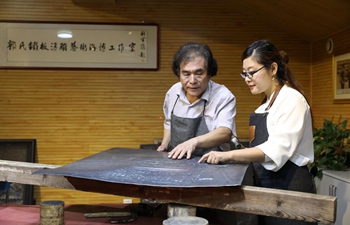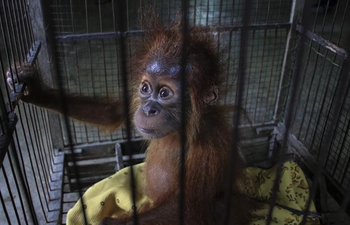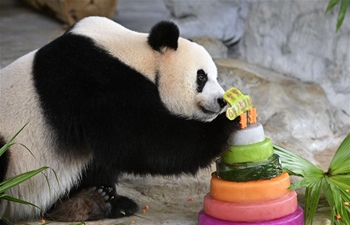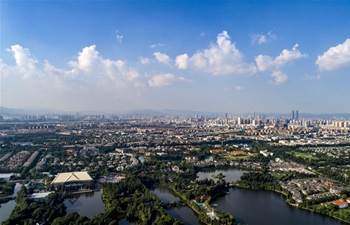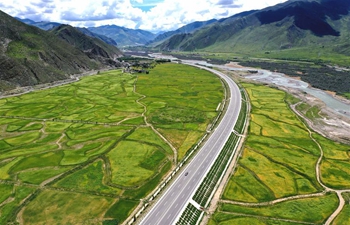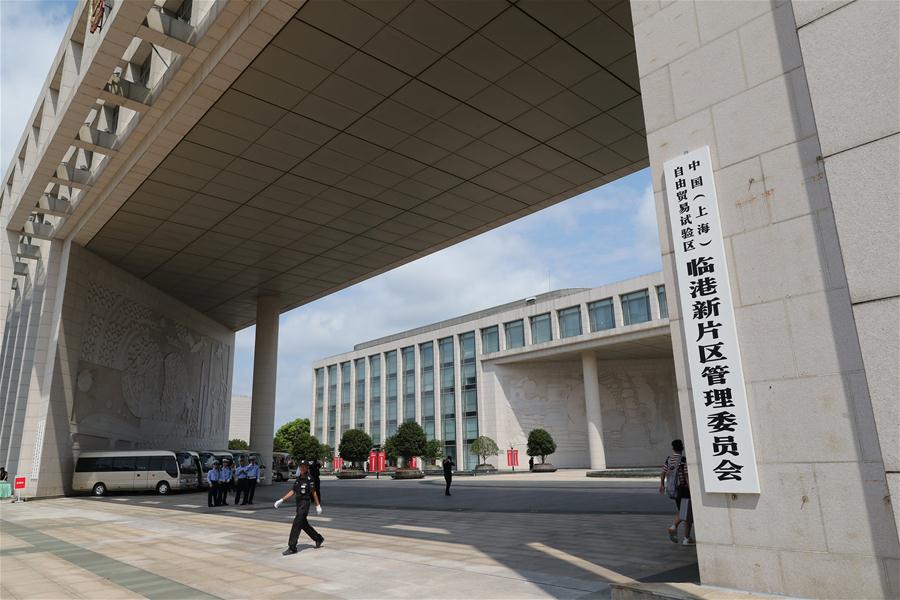
Photo taken on Aug. 20, 2019 shows an exterior view of the Lingang area administrative committee in east China's Shanghai. The new Lingang area of the China (Shanghai) Pilot Free Trade Zone was officially launched Tuesday. The new section will match the standard of the most competitive free trade zones worldwide and will facilitate overseas investment and capital flows and realize the free flow of goods, according to the area's development plan. (Xinhua/Fang Zhe)
SHANGHAI, Aug. 20 (Xinhua) -- The new Lingang area of the China (Shanghai) Pilot Free Trade Zone was officially launched Tuesday.
The new section will match the standard of the most competitive free trade zones worldwide and will facilitate overseas investment and capital flows and realize the free flow of goods, according to an overall plan for the area issued by the State Council earlier this month.
The new Lingang area will be built into a special economic function zone with global influence and competitiveness, according to the plan.
At the opening ceremony, Shanghai Lingang New Area Economic Development Co., Ltd., wholly owned by the Lingang Group, obtained a business license, the first in the newly launched area.
The company, with an initial registered capital of 2 billion yuan (283 million U.S. dollars), will be responsible for a host of tasks in the core district of the modern service open zone in the Lingang area, including the development and construction, industrial introduction, functional innovation and investment attraction.
Zhu Zhisong, deputy secretary-general of the Shanghai municipal government and executive deputy director of the Lingang area administrative committee, said the new Lingang area would be built into a new engine for China's reform and opening up.
It aims at opening up to the outside world at the highest level, creating experimental reform and opening up fields best suited to innovation and breakthroughs, and building a free and open economic system, he said.
The Shanghai FTZ had an area of 28.78 square kilometers when it was established in September 2013 and expanded to 120.72 square kilometers in December 2014.
The new Lingang area has a start-up area of 119.5 square kilometers.
According to the development plan, by 2025, the new area will have a relatively mature institutional system of investment and trade liberalization and facilitation.
By 2035, it will be built into a special economic function zone with strong global market influence and competitiveness, becoming an important platform for the country to integrate into economic globalization.
The area, administered like a special economic zone, will establish an institutional system with its focus on investment and trade liberalization and set up an open industrial system with global competitiveness.
Lingang area, home to Tesla's gigafactory, has become a cluster of high-end industries after more than a decade of development, and it now emphasizes the development of key industries like integrated circuits, AI, biomedicine and civil aviation.
Yin Chen, secretary-general of the Shanghai Free Trade Zone Comprehensive Research Institute with Fudan University, said that with more openness, the new area can boost Shanghai's high-end resources allocation ability and better represent the country to take part in global cooperation and competition.
The addition of the new area to the FTZ is expected to be a boon for both domestic and foreign businesses.
The new area will strive to become a business cluster for international business, cross-border financial services, frontier technology research and development and cross-border services trade, and speed up the industrial upgrading of existing companies.
Income tax shall be levied at a reduced rate of 15 percent within five years from its establishment for qualified enterprises engaged in manufacturing and R&D in key fields including integrated circuits, artificial intelligence, biomedicine and civil aviation.
Qiu Ciyun, CEO of Shanghai ZINGSEMI semiconductor technology company, said at the opening ceremony, "the preferential policies in terms of talent and taxes in the new area are important for high-tech manufacturers like us."
The Tesla factory has also seen new progress recently. The first phase of the project obtained its first comprehensive acceptance certificate on Aug. 19.
"In just a few months, we have completed the construction of the factory, as well as equipment installation and testing," said Tesla's Global Vice President Tao Lin.






